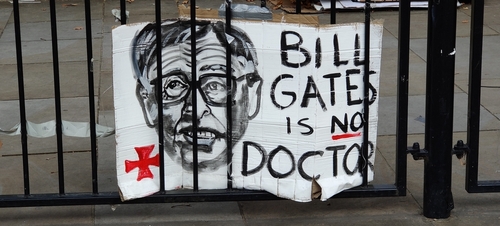Michelle Pfeiffer’s public blast at Bill Gates and the approval of an “organic” produce coating by U.S. health officials has thrown a spotlight on the ongoing battle for transparency and trust in our nation’s food supply—raising questions the bureaucrats, the so-called “experts,” and the investment class would rather you not ask.
Hollywood’s Outcry Ignites Food Safety Firestorm
Michelle Pfeiffer, beloved by generations for her work on screen, took to social media in July to deliver a verbal haymaker to both Bill Gates and the bureaucratic machine that just green-lit Apeel’s “edible” produce coating for use on organic fruits and vegetables. Calling the move “very concerning,” Pfeiffer didn’t mince words: she accused Gates of contaminating the food supply and warned her followers to steer clear of stores selling Apeel-treated produce. Her post went viral overnight, touching a nerve with Americans who are sick and tired of elites meddling with what we eat while hiding behind a wall of experts and regulatory jargon.
Apeel Sciences, the company at the center of this storm, quickly fired back. They insisted Bill Gates has no current stake in the company, noting his involvement was limited to a seed grant over a decade ago. The company doubled down on its “plant-based” and “safe for consumption” messaging, citing Food and Drug Administration (FDA) and Organic Materials Review Institute (OMRI) approvals as proof that their product is above reproach. But this is America: we don’t take bureaucrats at their word, especially when it comes to what goes on our dinner tables. Celebrity outcry or not, the controversy exposed a deep and growing distrust in the guardians of our food supply, fueled by years of regulatory rubber-stamping and a lack of transparency from the companies cashing in on “green” food tech.
Regulatory Approval and the Gates Factor
The FDA and OMRI, quick to defend their oversight, have stated that Apeel’s coating is made from mono- and diglycerides derived from plant oils—primarily grapeseed—and that it’s perfectly edible, invisible, and effective at keeping produce fresh. They point to safety reviews, organic certifications, and a mountain of paperwork to back it up. But when you dig deeper, you see why the public remains unconvinced. The process used to extract and formulate the coating involves catalysts and solvents, and there’s been precious little disclosure about the full ingredient list for the organic version. Organic watchdogs and food co-ops are sounding the alarm, questioning whether the relentless march of food tech is blurring the lines between traditional organics and Big Ag’s next big thing. Americans who pay a premium for organic apples and cucumbers aren’t just buying freshness—they’re buying trust, and that trust is now in short supply.
Anthony Fauci lied.
Joe Biden lied.
Rochelle Walensky and the CDC lied.
Rachel Maddow and the MSM lied.
Bill Gates lied.
Albert Bourla and Pfizer lied.
They ALL lied and MANY people died. pic.twitter.com/lLnpolVxSJ
— Gain of Fauci (@DschlopesIsBack) July 14, 2025
The Bill Gates connection, meanwhile, has become a lightning rod. Despite Apeel’s insistence that Gates has no ongoing involvement, the optics of a billionaire philanthropist with a history of meddling in global food and health policy seeding the company set off alarm bells for those who are already skeptical of elite-driven “solutions” to problems like food waste. Whether or not Gates is pulling strings behind the scenes, his early involvement gave Apeel the kind of credibility and momentum that only the ultra-wealthy can bestow, and it’s this pattern—money, influence, and regulatory capture—that has conservatives and organic advocates alike on high alert.
Consumer Backlash and Erosion of Organic Trust
Despite the parade of fact-checkers insisting Apeel is safe, the backlash is real and growing. Organic advocacy groups like the Cornucopia Institute are demanding more transparency and public input, warning that the approval process for new food technologies is happening behind closed doors, with little regard for the values that built the organic movement in the first place. Retailers are caught in the crossfire: some are refusing to stock Apeel-treated produce to avoid alienating loyal customers, while others quietly add the coating to their supply chain and hope nobody notices. The result is a fractured market and a wave of confusion, with consumers left to decipher cryptic labels and guess whether their so-called “organic” produce has been doused in a high-tech coating with an undisclosed ingredient list.
CHRISTIE BRINKLEY WARNS: DON’T BUY PRODUCE WITH BILL GATES “APEEL” COATING
She says only buy it if it has a “NO Apeel” label, and she’s not alone.
We have the power,” she says, joining Michelle Pfeiffer in sounding the alarm.They’re not feeding us.
They’re poisoning us. pic.twitter.com/j0roCW037T— HustleBitch (@HustleBitch_) July 11, 2025
The long-term implications go far beyond a single product or celebrity spat. If trust in the organic label continues to erode, the entire market could shift, with consumers demanding untreated produce and retailers scrambling to keep up. Regulatory agencies, already under fire for cozy relationships with industry, may be forced to tighten transparency requirements and give the public a real voice in what counts as “organic.” Until then, the controversy over Apeel is just the latest skirmish in a much larger war—a war over who controls America’s food supply, and whether “organic” still means what it used to mean.
Sources:
Click this link for the original source of this article.
Author: Editorial Team
This content is courtesy of, and owned and copyrighted by, https://www.conservativecardinal.com and its author. This content is made available by use of the public RSS feed offered by the host site and is used for educational purposes only. If you are the author or represent the host site and would like this content removed now and in the future, please contact USSANews.com using the email address in the Contact page found in the website menu.








